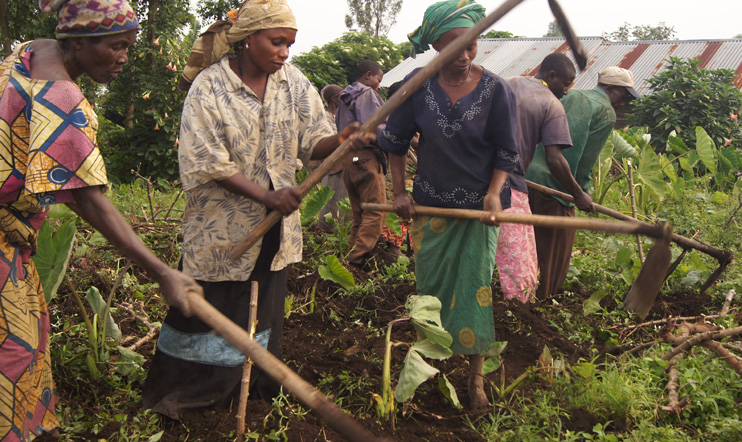DR Congo: Saving bananas revives local economy
24-04-2014 Feature
Minova, a small town in South Kivu, hasn’t been spared by the bloody war that has raged in the eastern provinces of the Democratic Republic of the Congo over the past two decades. Minova is north of Bukavu and has received displaced people from both North and South Kivu, particularly during the fighting between the M23 rebels and the Congolese army in and around Goma in November 2012.

Banana replanting project supported by the ICRC near Minova. This work will help revive the local economy, which is heavily dependent on bananas. CC BY-NC-ND / ICRC / Pascal Nepa
Minova and its environs used to be the province’s main banana-growing area, but in 2006 bacterial wilt (BXW) began attacking the banana plantations. Eventually, all the trees died, causing a drastic fall in farmers' incomes.
Dunia Wabo lives with his wife and their seven children in Kitembo, 15 km from Minova. Like his neighbours, he was severely affected. “So I set up an association of the farmers in my village. We decided to join forces to revive agriculture here. With help from the ICRC, we've received new banana cuttings – healthy shoots – from the provincial government. I’m hoping things will soon improve.”
It's all part of the ICRC's efforts that began last year in support of a government project to replant banana trees in the Minova area. “The farmers are given healthy shoots to replace the trees wiped out by disease and get production going again,” said John Niyoreye, an ICRC agronomist. “In all, some 25,000 people have benefited from this project.”
Pierre Gusira was born in Minova. He now works in Goma for an international organization, but he's attached to his native soil and goes back to his village every so often to cultivate the field he inherited from his ancestors. “If it weren't for these bananas," he points out, "I wouldn’t have had the education I did and I wouldn’t be who I am today. That’s why I can’t just abandon this field. I know a lot of farmers in my village prefer to grow coffee these days, but it was bananas that enabled our parents to raise us. And the people who switch to coffee are forgetting that its price is set internationally, while the price of bananas is set locally. Not just that but the bananas are sold and eaten right here.”
The ICRC’s aim in its agronomic projects is to kick-start food production by people who have suffered the effects of armed conflict, especially those forced to flee their homes as well as returnees who have to start all over again. In South Kivu such projects include the distribution of healthy cassava cuttings and soya, maize and bean seed. The ICRC also supports local farmers’ associations.

New banana plantations.CC BY-NC-ND / ICRC / Pascal Nepa
